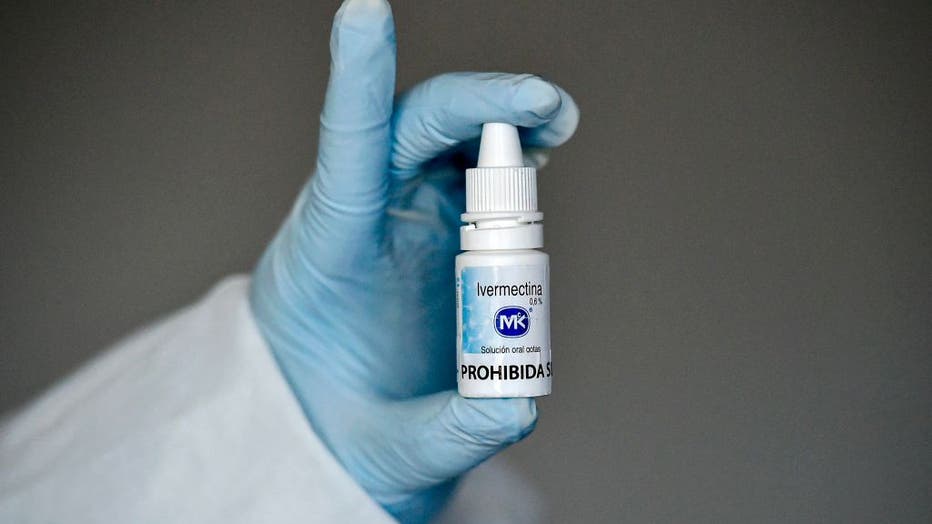Doctor pleads for review of data on ivermectin as COVID-19 treatment during Senate hearing
Dr. Pierre Kory discusses data on ivermectin as COVID-19 treatment
Dr. Pierre Kory, a lung and ICU specialist, testified Dec. 8 before a Senate hearing on early treatment for the virus and discussed findings with NewsNOW from FOX.
WASHINGTON - As researchers around the world search to find existing drugs that can be repurposed to treat COVID-19, the potential effectiveness of one drug was highlighted in a Senate hearing on early treatment for the virus.
Ivermectin is an approved anti-parasitic drug known to be effective against a variety of viruses like influenza, dengue, and Zika.
Dr. Pierre Kory, a pulmonary and critical care specialist, passionately testified Tuesday before the Senate Committee on Homeland Security and Governmental Affairs during a hearing on "Early Outpatient Treatment: An Essential Part of a COVID-19 Solution."
In his testimony, Kory said data shows the ability of ivermectin to prevent COVID-19, as well as its ability to keep those with early symptoms from progressing to the hyper-inflammatory phase of the disease, and to help critically ill patients recover.
"People are dying at unacceptable and untold rates," Kory told the Senate panel. "I am a lung and ICU specialist, and all I do right now is take care of COVID-19 patients dying of breathlessness in ICUs. By the time they get to the ICU, it is nearly impossible to save most patients. They simply cannot breathe."
Kory is also president of the Frontline COVID-19 Critical Care (FLCCC) Alliance, a nonprofit made up of critical care experts and researchers from around the world. The organization was formed in March at the onset of the pandemic and has been “working tirelessly reviewing the world’s literature on almost every aspect of this disease,” Kory said.
He called upon the National Institutes of Health (NIH), the Centers for Disease Control and Prevention (CDC), and the Food and Drug Administration (FDA) to review the latest medical research on the drug as a COVID-19 treatment.

A health worker shows a bottle of ivermectin in a file image taken on July 21, 2020 in Cali, Colombia. (Photo by LUIS ROBAYO/AFP via Getty Images)
“I can’t help but get emotional,” Kory told NewsNOW from FOX following his testimony. “This is not the flu, and I’m so tired of hearing that. I’m losing patients of all ages, all ethnicities and they’re all dying.”
As the world awaits widespread distribution of a forthcoming coronavirus vaccine, which will take months to have a sufficient impact on the general public following FDA approval, many public health experts have sounded the alarm about the continuing crisis in the interim. Record COVID-19 hospitalizations and deaths have been reported in the United States in recent days.
Kory called a lack of governmental guidance and research on effective early, preventive treatment “unconscionable” amid overwhelmed ICUs. Kory added that he believes ivermectin and a forthcoming coronavirus vaccine are “complimentary” in working to end the pandemic.
The NIH in August recommended that ivermectin only be used in clinical trials amid a lack of studies at the time. But Kory testified that much of the data reporting efficacy of ivermectin in the treatment and prevention of COVID-19 has been published since that time.
The FLCCC Alliance has compiled a manuscript detailing results from more than 20 studies on the subject, with more than 10 of them being randomized controlled trials.
One study published on Dec. 2 in the International Journal of Infectious Diseases found that a five-day course of ivermectin was found to be safe and effective in treating mild COVID-19 adult patients. The trial involved 72 hospitalized patients in Bangladesh, and researchers said larger trials are needed to confirm the preliminary findings.
Another large study, published in November as a preprint, found the addition of ivermectin to standard care to be a “very effective drug for treatment of COVID-19 patients with significant reduction in mortality compared to hydroxychloroquine plus standard treatment only.”
While many medications continue to be studied and tested, the FDA has approved only one antiviral drug called remdesivir to treat COVID-19 in adults and children ages 12 and older.
“We need to implore our government and leaders to revise their recommendations. It’s over three months old. They need to update it now,” Kory said.
This story was reported from Cincinnati.

